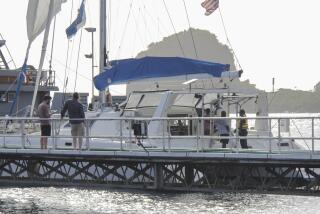Synagogue Reunites Death Camp Survivor With Angel of Mercy
To: “U.S. Army Hospital, Passau, Germany. 16 May 1945
“I thank the U.S. Army for saving my life. I have been three years in the concentration camp and was very ill. The 5th of May, as [angels sent] from heaven, U.S. soldiers came in the camp and 130 boys more dead than alive were saved. “
--Jack Pinto
A barber who survived six concentration camps and the caprice of Dr. Joseph Mengele and avoided the gas chamber only because he was needed to shave the hair from other prisoners destined to die, was reunited Sunday with the U.S. Army nurse he credits with restoring his will to live 50 years ago.
Shedding tears amid the strains of a Hebrew folk song, Jack Pinto embraced Aldean Mason and tearfully told the 200 people attending the surprise reunion at the Warner Center Marriott in Woodland Hills, “I’m so proud to be with the nurse who brought me back to life.”
The nurse, now thin and frail, had never forgotten her patient either.
“I kept your note for 50 years,” she said of Pinto’s letter thanking the Army for saving his life. “I never thought I would meet the author of that note again.”
The crowd at the hotel ballroom cheered the now-aged couple and swept them onto the dance floor. Pinto, 87, walked around the room with eyes reddened by tears and joy.
He had no idea when he showed up for the eighth annual banquet of the Beit Hamidrash Synagogue in Woodland Hills on Sunday that synagogue officials had contacted Mason, who Pinto knew as Aldean Nelson, and had flown her out from Michigan for the reunion.
“She’s a beautiful lady,” he said after embracing her. “She was so wonderful. She wanted me to live, to tell the world.”
The story of their fellowship and its revival spans two continents, involves Hollywood mogul Steven Spielberg and provides a testament to a friendship forged in turmoil.
Pinto, his wife, Ella, and their two children were arrested July 27, 1942, and packed on a train. Somewhere in Poland, the cattle car was opened and he was dragged from them. His last memory of them is the train car door slamming shut, and “my children were crying, ‘Daddy! Daddy!’ ”
It was the first of six camps he would be sent to. The Amsterdam barber survived because he was needed to shave the heads and bodies of the men and women transported across Nazi-occupied Europe to be exterminated.
Once, he was spared by Mengele, the infamous death camp doctor, who separated Pinto and 16 others who had blonde hair and blue eyes from a group destined for the gas chambers, on the remote chance that they had Aryan blood. Pinto didn’t: He is a Sephardic Jew who traces his ancestry to Portugal.
In the camps, he managed to steal food and lived through the beatings that followed when he was caught scrounging a scrap of bread. He tried to escape once by jumping from a transport train into waist-deep snow. He was captured days later and was not freed until Allied soldiers found him and 129 others lying near death in the barracks at Dachau.
He was covered with lice. Soldiers doused him with DDT, the improbable first step in his recovery.
Then, in the hospital shortly after he was liberated, he met Mason. He weighed 62 pounds and was being fed intravenously because he could not find the strength to eat.
To Pinto, the nurse from America was a vision, a woman for whom the only adjective he can find is “beautiful.”
Aldean Mason was in her 20s, attached to the Allied advance in the final days of World War II. As one of the few survivors who spoke English, Pinto in turn became a lifeline to her, and a witness to the terrors of concentration camp life.
As he recovered from malnutrition and pneumonia, they talked constantly. Mason would sit for hours on the edge of the bed in Ward B, Room 27, and just listen.
Over the years, Pinto has told his story to schoolchildren and reporters, to colleagues and to generals at an Air Force base in El Segundo where he once ran the barbershop.
Then he told his story on film, as part of an oral history project funded by Spielberg. The project was featured in USA Weekend, a magazine whose May 7 issue included a small photo of Pinto as a young man.
The former nurse saw the picture. She tracked him to Woodland Hills through a Holocaust foundation and called. Over the phone, they reminisced and cried. “It was a miracle,” he said.
Jack’s synagogue, the Beit Hamidrash, offered to fly Mason to see Pinto. She told them she was not feeling well and declined.
But Mason slept on it and changed her mind. The synagogue’s president, Alan Shapiro, invited her to its eighth annual banquet Sunday to receive a humanitarian award.
On Sunday night, neither could remember the restorative words that she spoke to him, only the emotional bond that they shared five decades ago.
After listening to the strains of “Ani Mamin”--”I Believe in the Coming of the Messiah”--Mason and Pinto put their arms around each other. Mason, glimmering in a gold-and-black sequined dress, held Pinto’s hand, lightly stroking it; Pinto’s family gathered around her, thanking her for helping him.
Pinto, frail and balding as he approaches his 88th birthday, thought the phone call from Mason was astonishing enough. The reunion left him almost speechless.
So Mason did some of the talking herself. “We really had compassion for the victims,” she said. “We were just doing our duty.”
More to Read
Start your day right
Sign up for Essential California for news, features and recommendations from the L.A. Times and beyond in your inbox six days a week.
You may occasionally receive promotional content from the Los Angeles Times.






